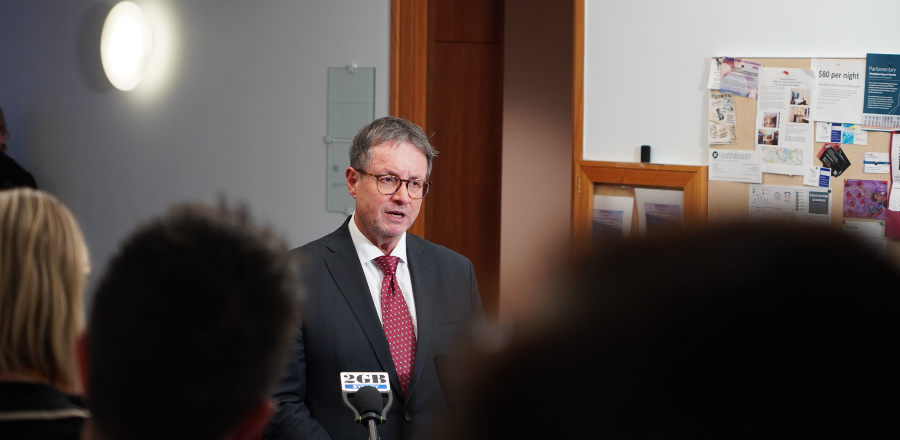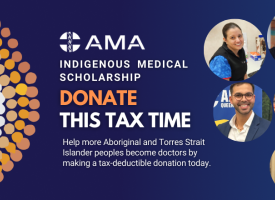Budget a missed opportunity to tackle health system issues
After laying a strong groundwork in last year’s budget and reaching an important agreement at the December 2023 National Cabinet meeting, this budget is a lost opportunity to make further progress in addressing key health system challenges, including greater funding and support for patients to access care in general practice.

Australian Medical Association President Professor Steve Robson said there was little that was new in this year’s budget, and this represented a real loss of momentum towards a more efficient and sustainable health system.
“MyMedicare provides the government with a real platform to reform general practice and improve access and affordability for patients, but the extra funding needed to build on this initiative was missing in tonight’s budget,” Professor Robson said.
“More urgent care clinics is not a long-term strategic solution, and the government keeps looking to fund more of them without proper evaluation of their impact. What we need is reform that enables general practice to deliver the primary care that our patients need, not piecemeal announcements and changes that further fragment the system.”
Professor Robson said every general practice has the capacity to provide urgent care and the AMA would have liked to see the government improve funding arrangements for general practice so patients can see their usual GP when they need to, including out of normal business hours, along with changes to encourage more doctors to take up general practice.
“Australia has a GP shortage that will only get worse. We need to encourage more doctors to take up general practice by ensuring GP trainees are offered equitable employment conditions in comparison to their hospital counterparts. And we need an independent planning agency to ensure that the future health workforce meets community need.”
Professor Robson said the AMA was disappointed the federal government, together with the states and territories, had not detailed how they would tackle the blowout in planned surgery waitlists in public hospitals.
“Just weeks ago, we released a report showing planned surgery wait times in our public hospitals are now the longest on record, and emergency departments remain strangled by access block,” he said.
“The additional investment through the next hospital agreement is very welcome but we have hundreds of thousands of Australians waiting in pain for planned surgery. Unless the Commonwealth and the state and territories come up with a funded plan to address this, patients will continue to suffer, with their conditions getting worse, their quality of life significantly impacted and the long-term cost to the health system being higher.”
Modest relief for patients through the freezing of the PBS copayment is very welcome, although the decision to phase out the optional $1 discount on patient copayments will further entrench the anticompetitive arrangements in the pharmacy sector that review after review has called out.
The budget sends some welcome signals on women’s health with the announcement of new Medicare items for longer consultations for complex conditions such as endometriosis and pelvic pain and a commitment to review the adequacy of Medicare funding for long-acting reversible contraceptives and diagnostic imaging procedures.
An additional 24,100 home care packages for 2024/25 is also a welcome measure to help support older Australians remain in their homes for longer.
The budget details some additional funding for mental health services but we are concerned to see that the critical role of general practice in caring for patients with complex physical and mental health needs will be undermined by the removal of specific Medicare items for the review of a mental health care plan, which is often undertaken as part of a broad assessment of a patient’s physical and mental health needs.
The decision to introduce indexation of Medicare funding for some pathology services is a step in the right direction and we are pleased to see additional funding for nuclear medicine.
Meanwhile, Professor Robson said preventive health was again the loser in this year’s budget, with the government missing an opportunity to raise billions of dollars for preventive health by introducing a sugar tax on sugary drinks.
“This is a win-win policy, with an approximate 20 per cent health levy on sugary drinks raising around $1 billion each year ― money that could be invested into measures that reduce pressure on our stretched health system.
“Research shows there could be 4,400 fewer cases of heart disease, 16,000 fewer cases of type 2 diabetes, and 1,100 fewer strokes over 25 years if the government takes this step but we’ve not seen a government brave enough to tackle the industry groups opposed to this measure.”
Reform was also needed in the private health insurance sector, with the increased cost-of-living and perceived lack of value in insurance, potentially leading to people dropping insurance and putting further strain on the public hospital system.
“Patients are being hit with rising private health insurance bills as their providers funnel significantly more money into management expenses, dwarfing any increase in rebates and benefits,” Professor Robson said.
“We need a 'value mandate' for private health insurers to return a minimum 90 per cent, on average, of premium dollars paid each year back to the consumer in the form of rebates and benefits. And we need an independent Private Health Insurance Authority to ensure the system is fair and balances everyone’s interests.”
Read Professor Steve Robson's post-budget doorstop transcript



